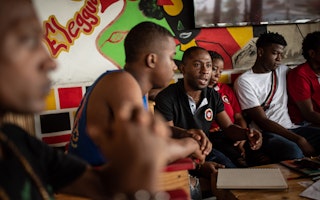Four Scenarios for Latin American Democracy in 15 Years
By Pedro Abramovay
Reflecting on the last 30 years, Latin America’s future seems promising. Military dictatorships are gone, hundreds of millions of people have escaped extreme poverty, and economic inequality is in decline.
But the region’s challenges are still troubling. Environmental devastation has increased, new forms of authoritarianism threaten democratic governance, socially and politically conservative views are becoming more entrenched, and homicide rates are the highest in the world.
This is not a case of the glass being half-full or half-empty; rather, it is about reconciling Latin America’s future possibilities and potential with its current fears and dangers.
One fundamental difference between the present and the past is that Latin America owns its destiny. From colonialism to imperialism to the Washington Consensus, outsiders have historically decided what the future of the region would look like. But now Latin Americans are deciding their fate and future. This is a new and significant responsibility. To guide the direction of Latin American democracies in the coming decades, it will be essential for us to examine and reconcile these fears and hopes.
Perhaps the greatest barrier to dialogue is the polarization that has swept the continent. How can we harness Latin America’s richness and diversity to foster democracy when seemingly every public policy discussion devolves into a short-sighted political dispute?
Looking towards the future can help us overcome the obstacles of the present. With this approach in mind, the Open Society Foundations, Fundacion Avina, the Ford Foundation, and REOS Partners brought together an impressive group of Latin Americans from different backgrounds—including congressmen, journalists, academics, former ministers, indigenous leaders, and student activists from 13 countries—to prepare for the future by creating four scenarios for the possible state of Latin American democracy in the next 15 years. They met over the course of the last year to propose four possible futures for our region.
The four futures reflected varying degrees of promise and consequence. In the first scenario, “Democracy in Transformation,” democracy in Latin America is strengthened through institutional innovation. A widespread and persistent demand for a reassessment of the region’s democratic institutions slowly leads to reforms of its most pressing structural problems.
The second scenario, “Democracy in Mobilization,” depicts protest, pressure, and popular creativity as the catalysts for change. A consolidated social mobilization pushes democracy forward, proving that individual and collective actions, more than state actions, can generate large-scale changes that solve public problems and renew the democratic model.
In the last two scenarios, democracy in Latin America is seen from less promising perspectives. “Democracy in Tension” illustrates a democracy where power is concentrated and disputed among different political and economic forces, generating social frustration. Political and economic power is concentrated, and the region is marked by a caudillo, or militarized political culture, rife with patronage and authoritarian tendencies. Some countries go through political crises and, in certain cases, authoritarian setbacks, with serious consequences for institutional structures and citizen rights. Democracy has endured but few are satisfied with the ways in which it has done so.
In the last scenario, “Democracy in Agony,” democracy in the region is hijacked by organized crime and special interests, generating fear and a sense of defeat among citizens. In much of Latin America, the predatory influence of illicit activities prevails over or coexists with government action. Corruption serves as a way of life for politicians, businesspeople, and criminals alike. The shared destiny of democracies in the region is unstable.
We invite all those interested and willing to become relevant actors in our democracies to ask themselves with every act and every decision: “Which scenario I am contributing to?”
The scenario-building process will not reinvent democracy in Latin America, nor prevent a future free of uncertainties. But it can open up a space for us to navigate future possibilities and allow us to choose, not just accept, our own destinies.

Pedro Abramovay is vice president of Programs at the Open Society Foundations.


